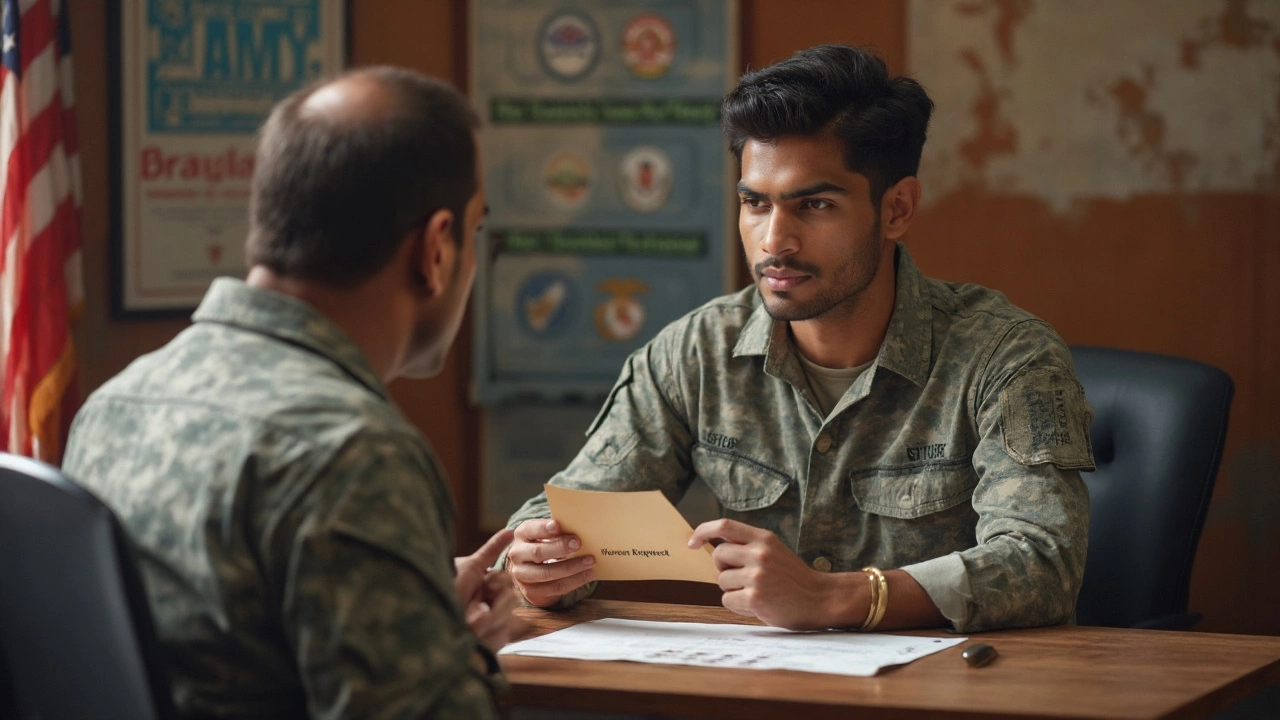Military Enlistment Eligibility Checker
Enter details about your criminal history and desired branch to check enlistment eligibility:
Military enlistment eligibility is a set of criteria that the U.S. Department of Defense (DoD) uses to decide who can become a service member. The rules cover age, education, physical fitness, and importantly, a person’s criminal record. If you’ve ever wondered whether a felon can wear the uniform, this guide walks you through the facts, the waiver process, and the differences among the five service branches.
Understanding the Core Requirement: Criminal Record Checks
Every recruit undergoes a background check that pulls data from the Department of Justice, state courts, and the National Crime Information Center. The purpose is to verify that the applicant meets the moral‑character standards set by the Uniform Code of Military Justice (UCMJ). Convictions for violent offenses, major drug trafficking, or serious fraud typically result in an automatic denial.
Who Counts as a Felon?
A felon is anyone convicted of a crime that carries a sentence of one year or more in a state or federal prison. The classification includes misdemeanors that have been upgraded to felonies through plea bargains. The type of felony matters: a non‑violent property crime might be waived, whereas a violent assault almost always blocks entry.
Branch‑Specific Policies
Each of the five armed services-Army, Navy, Air Force, Marine Corps, and Coast Guard-has its own tolerance level for past convictions. Below is a quick comparison.
| Branch | Typical Eligible Felonies | Waiver Requirement | Time Frame for Approval |
|---|---|---|---|
| U.S. Army | Non‑violent theft, minor drug possession | Case‑by‑case moral‑character waiver | 1-3 months |
| U.S. Navy | Traffic offenses, some drug infractions | Waiver from Recruiting Command | 2-4 months |
| U.S. Air Force | Minor property crimes, DUI (first offense) | Waiver under "Special Exception" policy | 3-5 months |
| U.S. Marine Corps | Very limited - mostly none | Rarely granted; high‑level board review | 4-6 months |
| U.S. Coast Guard | Similar to Navy; some drug offenses | Waiver via Coast Guard Recruiting Command | 2-4 months |
How the Waiver Process Works
The waiver is a formal request to the recruiting authority stating why the applicant should be considered despite the disqualifying offense. The steps are:
- Talk to a recruiter. The recruiter assesses the case and decides if a waiver is worth pursuing.
- Gather supporting documents: court records, character references, proof of rehabilitation (e.g., completion of a counseling program).
- Submit the waiver packet to the branch’s waiver board. The board includes senior officers, legal counsel, and a moral‑character specialist.
- Await a decision. The board can approve, deny, or request additional information.
Approval rates vary. According to a 2023 DoD report, about 27% of waiver requests for non‑violent felonies are granted, while only 4% for violent felonies receive approval.
Key Factors That Influence Success
Even with a waiver, some elements dramatically improve odds:
- Time since conviction: A clean record for five years or more shows stability.
- Rehabilitation evidence: Completion of drug‑treatment programs, community service, or vocational training counts heavily.
- Education: Holding a GED or higher reduces the perceived risk.
- Physical fitness: Showing exceptional fitness can offset moral concerns.
- Personal interview: A compelling, sincere interview with the recruiter can sway the waiver board.

What Happens After Enlistment?
If the waiver is granted and you successfully enlist, you’ll be subject to the UCMJ just like any other service member. However, certain offenses remain off‑limits, and any subsequent violation can trigger an administrative discharge. A prior felony can also affect security clearance eligibility, limiting access to classified missions.
Alternatives for Those Who Can’t Get a Waiver
Not everyone can jump through the waiver hoop. Here are other pathways to serve the country:
- National Guard or Reserve: Some states have more flexible policies, especially for non‑combat roles.
- Veterans’ Support Roles: Civilian jobs in the Department of Defense, like logistics or IT, often accept applicants with criminal records after a background review.
- Community Service Programs: Programs such as AmeriCorps can provide a public‑service record that strengthens future waiver applications.
Common Myths Debunked
Myth #1: "All felons are barred forever." - False. Many branches do consider waivers for non‑violent felonies.
Myth #2: "You need a lawyer to get a waiver." - While legal advice helps, recruiters are trained to guide applicants through the paperwork.
Myth #3: "A waiver guarantees enlistment." - No. Even after a waiver, you must pass the ASVAB, physical exam, and meet other standards.
Next Steps for Prospective Enlistees
If you’re serious about joining, follow this short checklist:
- Obtain a copy of your criminal record and any court documents.
- Contact a local recruiter from the branch you prefer.
- Discuss eligibility and ask about the specific waiver form.
- Collect character references (employers, community leaders).
- Complete the ASVAB and physical fitness test.
- Submit the waiver packet and track its status.
Patience is key-waiver decisions can take weeks, but the payoff is a chance to start a new career.
Related Topics to Explore
Understanding the enlistment journey opens doors to other useful subjects:
- Military Occupational Specialties (MOS): Learn which jobs are open to waiver holders.
- GI Bill benefits: See how education assistance works for those with prior convictions.
- Security clearance process: Find out why some felonies block clearance.
- Veteran transition programs: Resources for life after service.
Frequently Asked Questions
Can any felon get a military waiver?
No. Waiver eligibility hinges on the felony’s nature, time elapsed, and evidence of rehabilitation. Non‑violent offenses such as petty theft or a single DUI have a better chance than violent crimes.
How long does a waiver take to process?
Generally 1-6 months, depending on the branch and complexity of the case. The Army is usually faster, while the Marine Corps may take longer due to stricter standards.
Will a felony affect my ability to get a security clearance?
Yes. Even if a waiver is granted, the clearance process reviews the full criminal history. Certain convictions-especially those involving espionage, fraud, or violent offenses-can result in a denial.
Do I need a lawyer to file a waiver?
A lawyer isn’t required, but legal counsel can help ensure documents are complete and correctly framed. Recruiters are also equipped to guide you through the process.
Can I join the National Guard if I’m a felon?
Some states allow felons into the Guard for non‑combat roles, especially if they have a waiver or a clean record for several years. Check with your state’s Guard recruiting office for specifics.
What are the most common reasons waivers get denied?
Denials often stem from recent violent offenses, lack of rehabilitation evidence, or multiple felony convictions. Incomplete paperwork also leads to quick rejections.
Is there an age limit for felons seeking a waiver?
All branches require you to be between 17 and 34 years old for enlistment, though some waivers extend the upper limit to 38 for specific roles. Age limits apply irrespective of criminal history.
